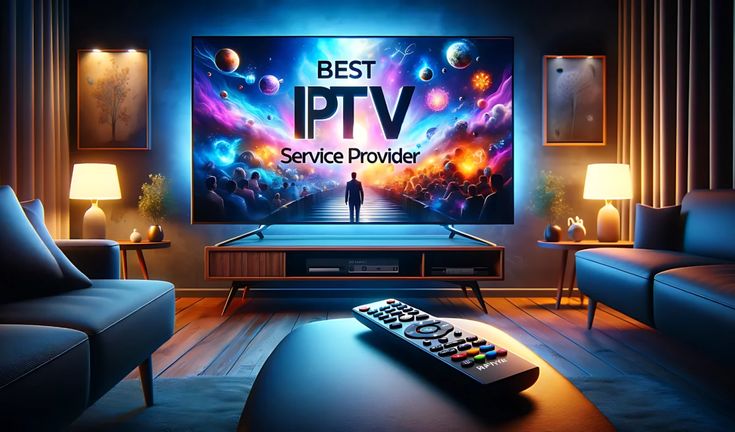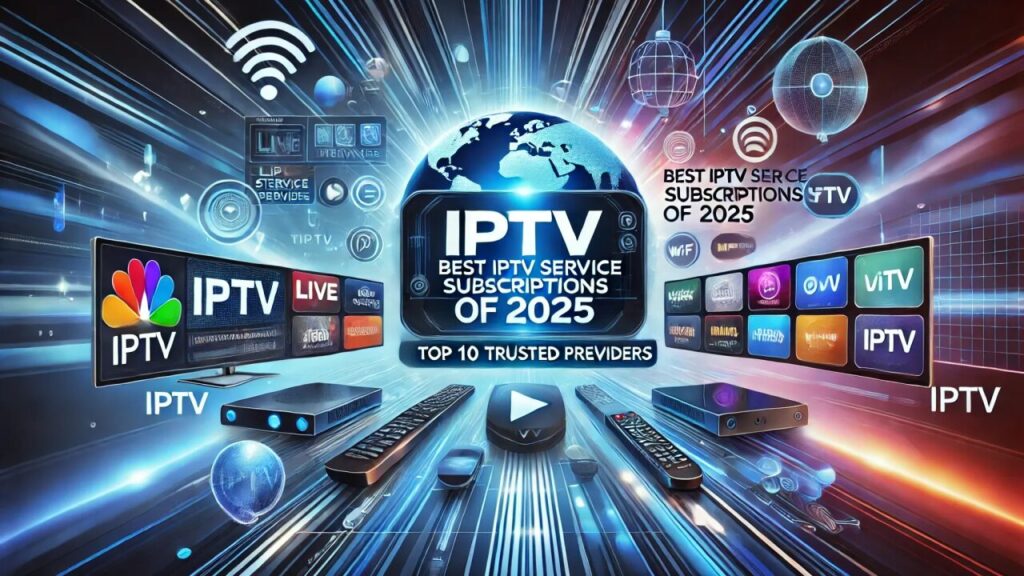Table of Contents
- What is IPTV Service? A Complete Guide for Beginners
- Understanding IPTV – What Does It Mean?
- How Does IPTV Service Work?
- Types of IPTV Services Available
- Benefits of IPTV Service
- Choosing the Right IPTV Service for You
- Is IPTV Legal? Understanding the Legal Aspects of IPTV
- Troubleshooting IPTV Service Issues
- How to Set Up IPTV on Your Device
- IPTV vs. Cable TV: Which One Is Better?
- How to Cancel Your IPTV Subscription (If Needed)
- Future of IPTV: What’s Next in IPTV Services?
- Final Thoughts on IPTV Service

What is IPTV Service? A Complete Guide for Beginners
In recent years, IPTV (Internet Protocol Television) has emerged as a popular alternative to traditional cable and satellite television. IPTV has transformed the way we consume TV content, offering flexibility, accessibility, and often more affordable options for watching shows, movies, and live events. But what exactly is IPTV?
IPTV refers to the delivery of television content through the internet, using Internet Protocol rather than traditional methods like satellite or cable transmission. Instead of receiving TV signals through coaxial cables or satellite dishes, IPTV sends content over an internet network.
Key Differences Between IPTV and Traditional TV Services
| Feature | IPTV | Traditional TV (Cable/Satellite) |
|---|---|---|
| Delivery Method | Delivered via internet (IP network) | Delivered via cable or satellite signal |
| Subscription Type | Subscription-based (monthly/yearly) | Subscription or pay-per-view |
| Channel Variety | Customizable (on-demand content) | Fixed packages (limited channels) |
| Picture Quality | HD, 4K streaming possible | Dependent on cable/satellite provider |
| Device Flexibility | Access on multiple devices (smartphones, tablets, PCs, smart TVs) | Mostly limited to TV sets |
Instead of receiving signals through traditional coaxial cables, IPTV streams content over the internet, allowing users to watch on-demand or live TV, depending on their service. The content is encoded into digital packets, transmitted through the internet, and decoded by devices such as set-top boxes, smart TVs, or apps.
A major advantage of IPTV is its ability to deliver Video on Demand (VOD), live TV, and time-shifted TV. VOD allows you to watch shows or movies whenever you want, live TV lets you tune into channels in real-time, and time-shifted TV allows you to pause, rewind, and fast-forward live content.
Why is IPTV Gaining Popularity?
- Cost Efficiency: IPTV can often be cheaper than traditional cable or satellite subscriptions, especially when you consider the variety of channels and on-demand content available.
- Convenience: You can access IPTV content on multiple devices, including smartphones, tablets, and smart TVs, offering flexibility in where and how you watch.
- Customization: IPTV services often allow you to select only the channels you want, reducing unnecessary costs.
- Global Content: IPTV gives you access to a wide array of international programming, perfect for viewers who enjoy content from different countries.
If you’re looking to explore more about IPTV, visit IPTV4KSmart for additional options and details on services.
Understanding IPTV – What Does It Mean?
IPTV stands for Internet Protocol Television. It’s a modern method of delivering television programming over an internet connection using internet protocols, as opposed to traditional broadcast methods such as satellite or cable. The basic concept behind IPTV is simple: it delivers TV content over the internet to viewers via digital packets.
How IPTV Differs from Other Streaming Services
Services like Netflix, Hulu, and Disney+ offer streaming of movies and shows via the internet, but IPTV is distinct in that it provides live television channels that operate much like traditional TV broadcasts.
IPTV services allow you to access live broadcasts, international channels, on-demand movies, sports, and much more. It’s different from services like Netflix that primarily focus on on-demand content.
How Does IPTV Service Work?
Understanding how IPTV functions is key to appreciating its value. Here’s a breakdown of how IPTV works:
- Content Acquisition: IPTV providers acquire content from broadcasters, networks, and media companies.
- Encoding and Compression: This content is encoded and compressed into digital data packets that are optimized for internet transmission.
- Transmission: The encoded content is then sent over the internet, through an IP network. This can either be a public network (internet) or a private, dedicated network.
- Decoding and Delivery: Once the data reaches the user’s device, the IPTV device (such as a smart TV or set-top box) decodes the signal and displays the content.
Key Components of IPTV
- Set-top box: A device that connects to your TV and internet, which decodes the IPTV signal and outputs it to your TV.
- Internet connection: A stable, high-speed internet connection is required for optimal IPTV performance. For standard HD streaming, 10 Mbps is usually sufficient, while 25 Mbps or higher is recommended for 4K streaming.
- Streaming device: You can stream IPTV on various devices such as smart TVs, tablets, smartphones, laptops, and streaming boxes.
Types of IPTV Services Available
IPTV comes in several types, with each catering to different user needs. Here’s a rundown of the main types of IPTV services:
1. Subscription-Based IPTV
These are paid IPTV services that provide a wide selection of live TV channels, on-demand content, and even cloud DVR functionality. Examples include:
- YouTube TV
- Hulu + Live TV
- Sling TV
- DirecTV Stream
- FuboTV
Pros:
- Access to a variety of live TV channels and on-demand content
- Cloud DVR features and multiple device support
Cons:
- Requires a monthly subscription fee
- Geographically restricted content in certain cases
2. Free IPTV Services
Free IPTV services exist, but they come with potential legal and security risks. Some free services are legitimate, while many others provide pirated content that can lead to legal issues for users.
Legitimate Free IPTV:
- Pluto TV (offers live TV and movies for free)
- Xumo (another free option)
Illegal Free IPTV:
Many illegal IPTV services offer an extensive range of channels but do not have proper licenses, putting users at risk of fines or malware.
3. IPTV Streaming Apps
IPTV apps like Kodi, IPTV Smarters, and Tivimate allow users to access IPTV content on a variety of devices. These apps connect to IPTV servers to stream live TV channels and on-demand content.
Pros:
- Ability to watch IPTV on multiple devices
- User-controlled content selection
Cons:
- May require technical setup and knowledge
- Some apps may have security vulnerabilities
Benefits of IPTV Service
IPTV offers numerous benefits, which is why it’s becoming so popular. Some of the key advantages include:
1. Cost-Effective Alternative to Cable TV
IPTV services are often much cheaper than cable TV, especially if you only want specific channels or on-demand content. You can customize your plan to suit your needs.
2. Flexibility and Convenience
IPTV can be accessed on smartphones, tablets, laptops, smart TVs, and set-top boxes, making it incredibly convenient. You can watch TV wherever you go, as long as you have a good internet connection.
3. High-Quality Streaming
IPTV allows you to stream in high-definition or even 4K quality, which makes for a better viewing experience compared to regular cable TV.
4. Access to Exclusive Content
IPTV services offer access to international channels, niche content, and live events, which may not be available through cable TV providers.
Choosing the Right IPTV Service for You
When selecting an IPTV service, consider the following:
1. Internet Speed Requirements
A stable internet connection is crucial. For HD streaming, at least 10 Mbps is required, while 25 Mbps or higher is ideal for 4K streaming.
2. Device Compatibility
Ensure that the IPTV service works with your devices, whether it’s a smart TV, smartphone, laptop, or streaming box.
3. Customer Support
Opt for IPTV providers that offer responsive customer service, especially if you run into technical issues.
4. Content Availability
Make sure the service offers the content you want, including live TV channels, movies, and sports.
Is IPTV Legal? Understanding the Legal Aspects of IPTV
The legality of IPTV depends on whether the service is properly licensed to distribute content. Here’s the breakdown:
1. Legal IPTV Services
Legal IPTV services include those like:
- Hulu + Live TV
- YouTube TV
- Sling TV
These services operate within the legal boundaries and provide secure, authorized content.
2. Illegal IPTV Services
Illegal IPTV services offer pirated content and can lead to legal consequences. Watching or subscribing to these services can result in fines or even legal action.
Always verify that an IPTV service is licensed and operating legally.
Troubleshooting IPTV Service Issues
Sometimes IPTV services may experience issues. Here are common problems and their solutions:
Common IPTV Problems
- Buffering: Check your internet speed or switch to a wired connection.
- Frozen or Laggy Streams: Restart your device or check with your IPTV provider for any service disruptions.
- Audio/Video Sync Issues: Try adjusting the settings or reinstalling the IPTV app.
How to Improve IPTV Streaming Quality
- Use a stable, high-speed internet connection.
- Reduce other internet activities while streaming.
- Connect to your router with an Ethernet cable for better stability.
How to Set Up IPTV on Your Device
Setting up IPTV is easy. Here’s how to get started:
Setting Up IPTV on Smart TVs
- Install the IPTV app from your TV’s app store (e.g., IPTV Smarters).
- Enter the IPTV provider’s server URL and credentials.
- Start watching your content!
Setting Up IPTV on Android and iOS Devices
- Download an IPTV app from the App Store or Google Play (e.g., Tivimate, IPTV Smarters).
- Enter the provider details.
- Begin streaming.
Using IPTV with Set-Top Boxes
- Plug in your set-top box.
- Connect to the internet.
- Install the necessary software (e.g., KODI, MAG box).
- Access your content.
IPTV vs. Cable TV: Which One Is Better?
| Feature | IPTV | Cable TV |
|---|---|---|
| Cost | Typically more affordable | Higher monthly fees |
| Content Variety | Extensive (global & niche) | Limited channels |
| Device Compatibility | Multiple devices | Mostly TV sets |
| On-Demand | Extensive VOD options | Limited on-demand content |
| Flexibility | Customizable (pause/rewind) | Live TV only |
Why IPTV Might Be Better than Cable TV
- Cost-effectiveness: IPTV is cheaper, especially with customizable plans.
- More content choices: IPTV offers access to international channels and niche content not available on cable TV.
- Flexibility: IPTV gives you more control over how you watch TV, with features like pausing, rewinding, and recording.
How to Cancel Your IPTV Subscription (If Needed)
To cancel your IPTV subscription:
- Contact Customer Service: Many IPTV providers have easy cancellation processes.
- Use the App or Website: Some services allow you to cancel directly via their app or website.
- Return Equipment: If your service requires hardware (set-top box), be sure to return it.
Future of IPTV: What’s Next in IPTV Services?
The Impact of 5G
5G will significantly improve IPTV by offering faster speeds and lower latency, resulting in better video quality and more interactive features.
On-Demand and Interactive Content
IPTV will continue to evolve, with more interactive and personalized content being offered to users.

Final Thoughts on IPTV Service
IPTV has changed the TV landscape, providing a flexible, cost-effective alternative to traditional cable TV. With its array of benefits, including customizable plans, international content, and high-quality streaming, IPTV is the future of television.
Explore more about IPTV options and features at IPTV4KSmart.
This concludes our comprehensive guide to IPTV services. Whether you’re looking to replace your cable service or just explore new entertainment options, IPTV offers an exciting and cost-effective way to watch your favorite shows and movies!
